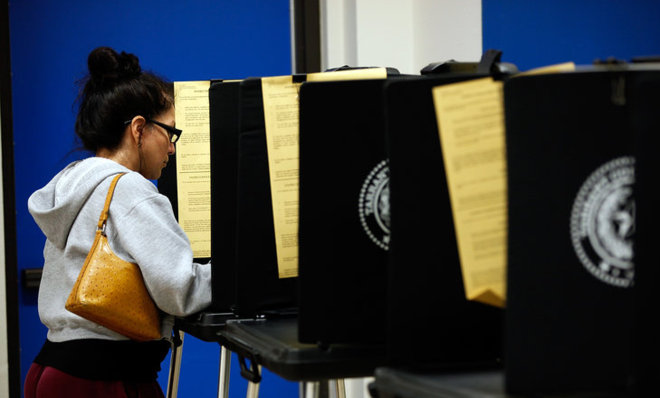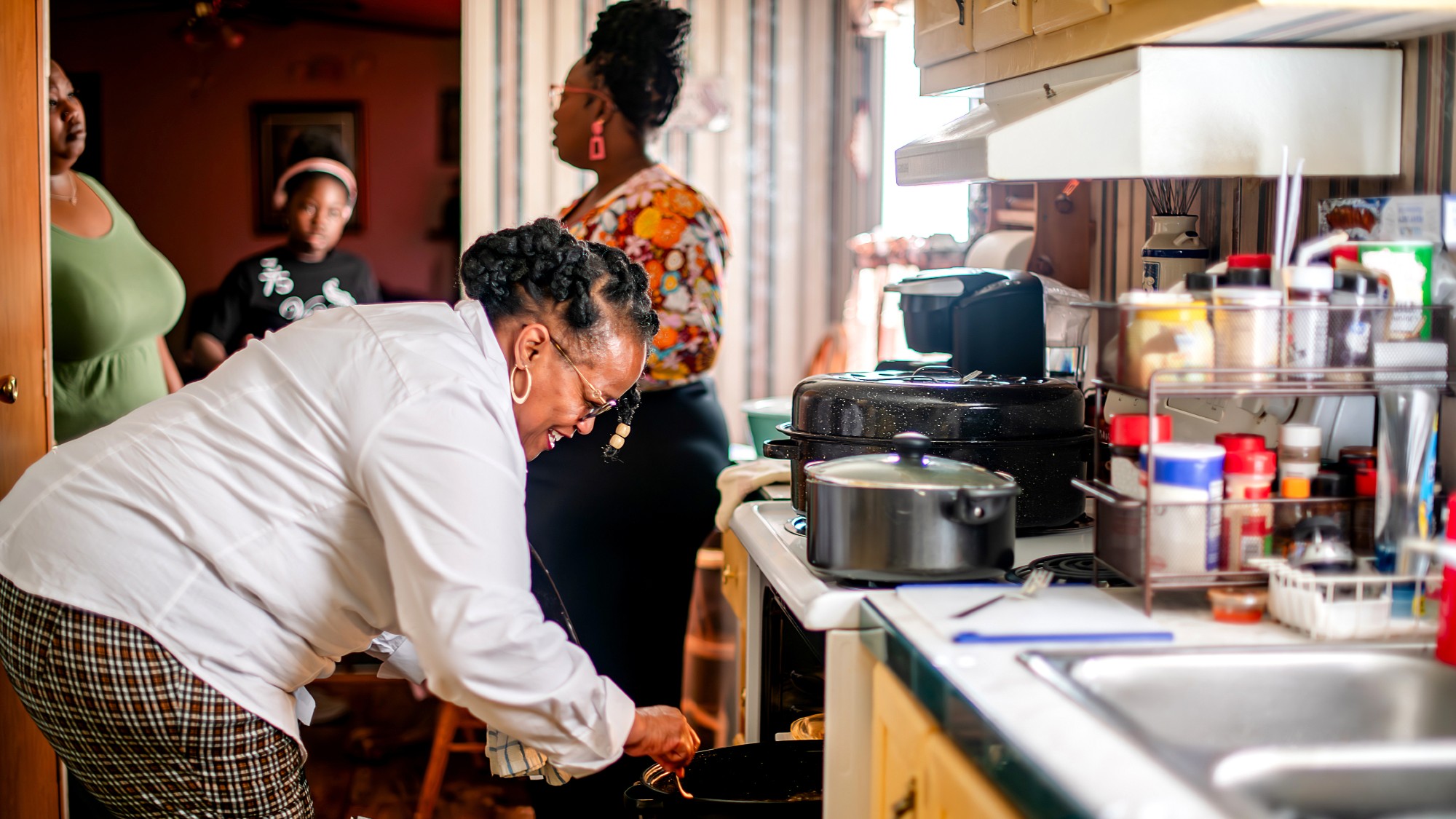Does Texas' new voter ID law disenfranchise women?
Critics of voter ID laws contend that they keep the poor, minorities, and students from voting. But women? That's a new one.


Voter ID laws tend to be a partisan issue.
Republican lawmakers generally pass the laws, arguing that stronger measures are needed to combat voter fraud and questioning why anybody would object to making sure only eligible voters cast ballots. Democrats tend to object anyway, waving studies showing that voter fraud is all but nonexistent and that voter ID laws disenfranchise groups like minorities, students, the poor, and the elderly, all of whom are less likely to have the proper identification.
Texas passed one of the nation's stricter voter ID laws in 2011. After a series of obstacles — the Justice Department sued to block the law under the Voting Rights Act, federal courts agreed, then the Supreme Court struck down the voting law's relevant section — the law took effect this week, when early voting started for the Nov. 5 election.
The Week
Escape your echo chamber. Get the facts behind the news, plus analysis from multiple perspectives.

Sign up for The Week's Free Newsletters
From our morning news briefing to a weekly Good News Newsletter, get the best of The Week delivered directly to your inbox.
From our morning news briefing to a weekly Good News Newsletter, get the best of The Week delivered directly to your inbox.
Critics of the Texas law say that, sure enough, the usual suspects are being disenfranchised. "Based on Texas' own data, 600,000 to 800,000 registered voters don't have the government-issued ID needed to cast a ballot, with Hispanics 46 to 120 percent more likely than whites to lack an ID," says Ari Berman at The Nation. And students?
Texas has the distinction of being one of the few states that allows you to vote with a concealed weapons permit, but not a student ID. Provisions like these suggest that the law was aimed less at stopping voter fraud and more at stopping the changing demographics of the state. Based on what we're seeing thus far, the law might better be described as the Republican Self-Preservation Act. [The Nation]
In Texas, there's a new wrinkle, though. Thanks to a provision in the law that requires the name on a voter's drivers license or other valid photo ID to be "substantially similar" to the name on the voter rolls, some women are reporting trouble voting. One of them was Sandra Watts, a state district court judge in Corpus Christi. She tells her tale to Kiii-TV News:
Watts says that her maiden name is listed as her middle name on her drivers license, as mandated when she got married in 1964. But since her given middle name is listed in the voter database, she was asked to either sign an affidavit swearing she is who she claims to be or cast a provisional ballot.
"What I have used for voter registration and for identification for the last 52 years was not sufficient yesterday when I went to vote," she told Kiii News. "I don't think most women know that this is going to create a problem." Watts won't be the only woman to run into trouble. According to a 2006 study from NYU Law's Brennan Center for Justice, 34 percent of female voters don't have an acceptable form of ID that reflects their current legal name.
A free daily email with the biggest news stories of the day – and the best features from TheWeek.com
Keep in mind that "Watts, as an experienced judge, is familiar with the intricacies of election law," says Aviva Shen at ThinkProgress. The low-income voters, minorities, and students "most likely to be stopped at the polls will be less informed about their rights." Provisional ballots won't be counted, for example, if the voter doesn't subsequently prove her identity.
This sounds pretty bad so far. But state election officials say the worries are exaggerated, that there are protocols in place to keep women from being disenfranchised because of mismatched names.
"We encourage poll workers to look at the entirety of the ID," Alicia Pierce, spokeswoman for the Texas secretary of state's office, tells The Texas Tribune. "If the names are similar but not identical, you sign an affidavit saying you're the same person." In most cases, she adds, poll workers are encouraged to "err on the side of the voter."
And that's the crux of the issue: Implementation of the voter ID law will be in the hands of poll workers with little training or experience with election law, and a significant number of the voters who bother to show up in an off-year election won't be prepared or even aware that the voting rules have changed.
Linda Krefting, president of the Texas chapter of the League of Women Voters, says the law is unnecessary, confusing, and a hindrance to democracy, but she is also opposed to making a big deal out of this potential hindrance to women voters. "We're afraid of scaring people away from the polls," she tells MSNBC. "We need more people voting, not less. We're worried if people make a big to do a about how problematic this law is it's going to encourage people to stay home."
As Democrats say about ObamaCare, the Texas voter ID requirement is the law of the land. It will probably stay that way unless a federal court strikes it down or Texas turns blue — and, since most of the groups that will have a harder time voting tend to vote Democrat, it might well help keep Texas from turning blue. For a while.
Joe Gandelman at The Moderate Voice warns the GOP that you can discourage groups of people from voting for now, but "in this age of social media and the Internet there will be grave consequences for GOPers who enact these laws." Women won't forget which party made it hard for them to vote, he says, and students "don't stay young forever." The GOP "risks alienating an entire generation by targeting them" this way.
Peter has worked as a news and culture writer and editor at The Week since the site's launch in 2008. He covers politics, world affairs, religion and cultural currents. His journalism career began as a copy editor at a financial newswire and has included editorial positions at The New York Times Magazine, Facts on File, and Oregon State University.
-
 7 bars with comforting cocktails and great hospitality
7 bars with comforting cocktails and great hospitalitythe week recommends Winter is a fine time for going out and drinking up
-
 7 recipes that meet you wherever you are during winter
7 recipes that meet you wherever you are during winterthe week recommends Low-key January and decadent holiday eating are all accounted for
-
 Nine best TV shows of the year
Nine best TV shows of the yearThe Week Recommends From Adolescence to Amandaland
-
 Bari Weiss’ ‘60 Minutes’ scandal is about more than one report
Bari Weiss’ ‘60 Minutes’ scandal is about more than one reportIN THE SPOTLIGHT By blocking an approved segment on a controversial prison holding US deportees in El Salvador, the editor-in-chief of CBS News has become the main story
-
 Has Zohran Mamdani shown the Democrats how to win again?
Has Zohran Mamdani shown the Democrats how to win again?Today’s Big Question New York City mayoral election touted as victory for left-wing populists but moderate centrist wins elsewhere present more complex path for Democratic Party
-
 Millions turn out for anti-Trump ‘No Kings’ rallies
Millions turn out for anti-Trump ‘No Kings’ ralliesSpeed Read An estimated 7 million people participated, 2 million more than at the first ‘No Kings’ protest in June
-
 Ghislaine Maxwell: angling for a Trump pardon
Ghislaine Maxwell: angling for a Trump pardonTalking Point Convicted sex trafficker's testimony could shed new light on president's links to Jeffrey Epstein
-
 The last words and final moments of 40 presidents
The last words and final moments of 40 presidentsThe Explainer Some are eloquent quotes worthy of the holders of the highest office in the nation, and others... aren't
-
 The JFK files: the truth at last?
The JFK files: the truth at last?In The Spotlight More than 64,000 previously classified documents relating the 1963 assassination of John F. Kennedy have been released by the Trump administration
-
 'Seriously, not literally': how should the world take Donald Trump?
'Seriously, not literally': how should the world take Donald Trump?Today's big question White House rhetoric and reality look likely to become increasingly blurred
-
 Will Trump's 'madman' strategy pay off?
Will Trump's 'madman' strategy pay off?Today's Big Question Incoming US president likes to seem unpredictable but, this time round, world leaders could be wise to his playbook
